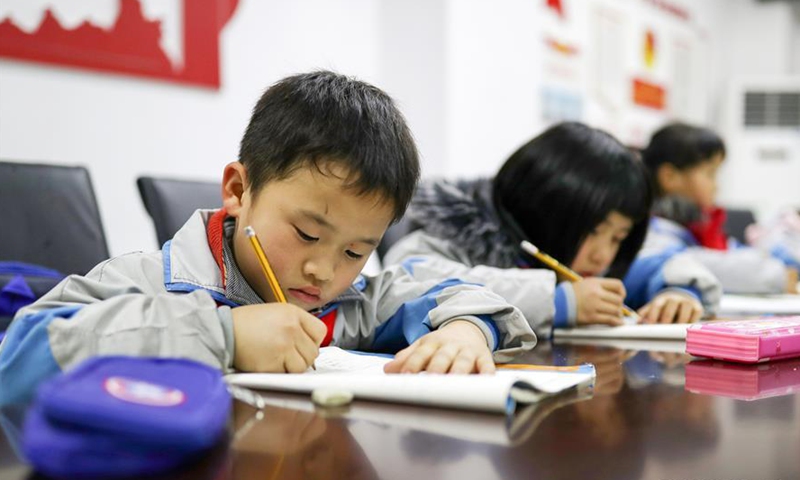
Primary students do homework at an after-school care center in Yuping Dong autonomous county in Southwest China's Guizhou province, Feb 27, 2019.Photo:Xinhua
Young Chinese are dealing with a severe lack of sleep and the situation is growing worse, a new health report showed on Monday.
China National Mental Health Development Report (2019-2020), jointly produced by the University of the Chinese Academy of Sciences' Institute of Psychology and the China Social Sciences Press, was released in Beijing on Monday.
According to the report, only 46.4 percent of Chinese adolescents' slept for eight hours or more on school nights in 2020, down 1 percent from 2019. Meanwhile, the average sleep time for Chinese teenagers in 2020 was only about 7.8 hours, 0.3 hours less than 2019.
Time asleep decreased as students progress through school grades with the average sleep time for students in primary, middle and high school being 8.7, 7.6 and 7.2 hours respectively.
It also shows that young students today are sleeping far less than a decade ago. In 2020, primary and middle school students got 40 minutes less sleep than a decade ago, while high school students got 10 to 20 minutes less.
An English teacher surnamed Pu at a high school in Southwest China's Chongqing Municipality told the Global Times on Tuesday that the main reason for the lack of sleep among high school students is due to academic pressure and poor time management.
"They have to maintain a high frequency of social interaction while taking care of their studies, so they have less time to sleep," said Pu.
The report recommends a goal of "eating well, sleeping well and exercising well," and cultivating healthy habits among students, including increasing the intake of vegetables and fruits, getting more sleep on school nights and increasing the frequency of exercise.
Chu Chaohui, a research fellow at China's National Institute of Education Sciences, told the Global Times on Tuesday that addiction to online games is only an issue for a small group of students while the main reason for a lack of sleep is the homework load.
He added that venerating exams has long been a tradition in education since ancient China, and even today students are pursing high scores in the gaokao, the college entrance examination, to get into good universities.
The report also launched a health survey of 8,447 college students in 2020, which shows that about 70 percent of undergraduate students also do not get adequate sleep.
"College students are also under great pressure to find a job," Chu added.
The report revealed that the mental health of students at all grades is generally positive, but a certain percentage of depression and anxiety problems among college students cannot be ignored.



